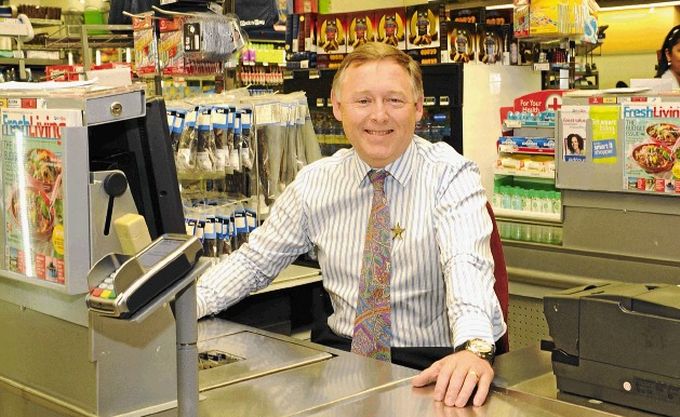Greenpeace on Tuesday made a formal marriage proposal to Pick n Pay, calling on the retailer to commit to a 100% renewable energy future, and ditch its “dirty love affair” with fossil fuels. In a peaceful protest action that took place at the Pick n Pay head office in Cape Town, South Africa, activists delivered a three-metre high engagement ring to Pick n Pay’s CEO Richard Brasher, and two climbers unfurled a banner above the entrance to the headquarters with the message “Pick n Pay: say yes to the sun”.

Greenpeace Africa launched the “Renewable Energy Champions” campaign in April this year, which aims to get South Africa’s top five retailers to commit to 100% renewable energy. The report, “Shopping Clean – Retailers and Renewable Energy” released at the start of this campaign, outlined how retailers in the country have made a start in the transition to 100% renewable energy, but that there is much work to do.
“It has become clear to us that Pick n Pay is not yet prioritising their transition to a clean electricity future and so we’re calling on them to make the difference and show solar some love. Pick n Pay has a clear opportunity and an ethical obligation to show the millions of South Africans who shop in their stores that they really care about the future of our country,” stated Penny-Jane Cooke, Climate and Energy Campaigner for Greenpeace Africa.
Pick n Pay has the highest per annum electricity consumption out of the five retailers researched by Greenpeace, which equates to the annual electricity consumption of 65,000 South African households. Renewable energy not only makes good business sense for the retail sector, as can be witnessed by the increasing number of shopping malls that are choosing to power their buildings with solar photovoltaics, but also provides a more sustainable development pathway for South Africa.
“Renewable energy provides a real opportunity for South Africa to move away from a development path based on polluting fossil fuels and expensive nuclear power, and retailers can take the lead to kick-start a renewable energy revolution for the benefit of all South Africa’s people, many of whom are Pick n Pay consumers,” added Cooke.
Greenpeace disclosed that it seeks to constructively engage with the retail sector around committing to a 100% renewable energy future through the Renewable Energy Champions campaign. To achieve this, it added, retailers need to be open to discussion and engagement, but more than this they need to commit to renewable energy and take urgent action.
“Greenpeace is calling on Pick n Pay to make the commitment to 100% renewable energy, to articulate how they will achieve this vision in the most ambitious timeframe possible, make the required investments and take the next step to lobby government to remove the barriers to renewable energy. Ultimately, by committing to 100% renewable energy, retailers will be opening up the space for millions of South Africans to generate their own power through lobbying government for better renewable energy legislation, and we’re calling on Pick n Pay to step up and take the lead,” concluded Cooke.
Ahead of Tuesday’s engagement ring delivery, other activities during the lead up included 200 stickers being placed on 11 Pick n Pay shops in Johannesburg, followed by a phone-in day when Greenpeace supporters called on Pick n Pay to take the lead. Earlier in the month, over 2,000 South Africans joined Greenpeace to send love letters to Pick n Pay’s CEO calling for a solid commitment to the sun.
